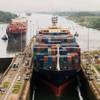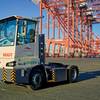Havenbedrijf Amsterdam N.V. realised revenue of EUR 150.1 million, compared to EUR 146.3 million in 2016. The operating result increased from EUR 73.3 million in 2016 to EUR 74.3 million in 2017. These and other key figures are stated in the annual report published.
Koen Overtoom, CEO of Port of Amsterdam: "Record transshipment of 81.3 million tonnes in 2017 contributed to our good operating result of more than 74 million euros. 2017 also saw the arrival of a number of fantastic businesses in the Port, such as Bio Energy Netherlands and Chaincraft, which are contributing to the achievement of our strategy and Vision2030. We have also expressed an ambition to prepare for being a coal-free port in 2030. 2017 was also a difficult year, in which issues such as Port City, Sprong over het IJ and the relocation of the PTA required much attention. We are convinced that the Port is not only part of Amsterdam, it serves Amsterdam and is helping the city achieve its ambitions with respect to circularity and becoming energy-neutral in the future."
All seaports in the Netherlands have to pay corporate income tax with effect from 2017. The net result after deduction of corporate income tax is EUR 60.9 million. The corporate income tax due for 2017 is expected to amount to EUR 14.2 million. Port of Amsterdam pays EUR 60,9 million dividend for 2017 to the City of Amsterdam as the sole shareholder.
Transhipment in the North Sea Canal Area rose to a record level of 100.8 million tonnes in 2017. Transhipment in the Port of Amsterdam was up 2.4% to 81.3 million tonnes (2016: 79.3 million tonnes). The increase occurred in virtually all cargo flows, with the largest rises in agribulk, ores and fertilisers. Transhipment of coal declined by 3 percent to 15.8 million tonnes.
The number of sea-going vessels visiting the port region (Velsen, Beverwijk, Zaandam and Amsterdam) in 2017 was 7,011 compared to 6,982 in 2016. The number of calls from inland shipping was 40,012m compared to 39,205. Amsterdam was visited by 134 sea cruise ships in 2017. The number of river cruise calls in Amsterdam was 1,946.
The storage and transhipment of fossil transport fuels such as petrol, diesel and kerosene are expected to continue to rise in the coming years. Transport fuels are important for the Port of Amsterdam due to the popularity of air travel. The circular cluster will also be expanded in 2018 with a number of new facilities and we will make further progress on energy transition.
Lack of space is an important issue. It is not only that the growing city is looking for space in the Port, the energy transition and the circular economy also require space.













